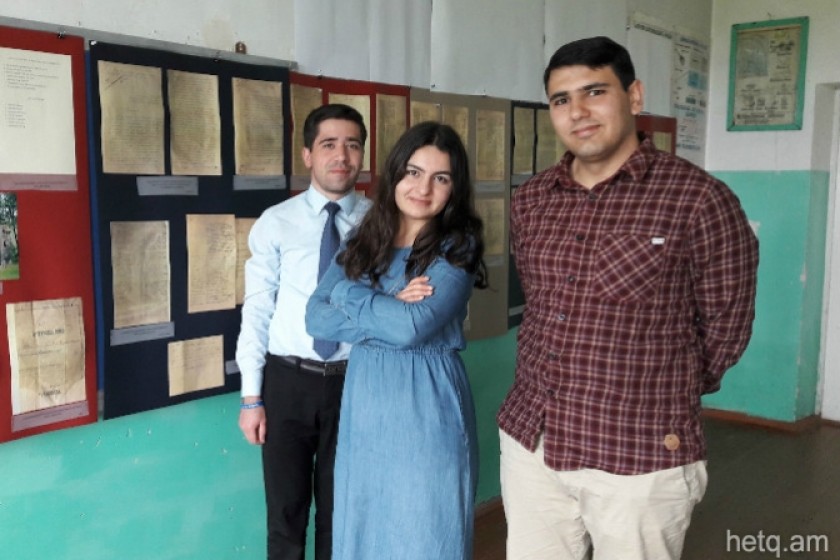
Rural Education Challenges and Benefits: Young Teachers in Armenia’s Urasar Village Bring Changes to Community
In a few days, the “last bell” at schools in Armenia will announce the educational year’s closing.
While graduating high school students are mostly busy rehearsing for their good-bye event, students in the final grade in Armenia's Urasar community, in Lori Province, are busy cleaning the club’s dilapidated hall and stage that haven’t been used for years.
The hall has been used to serve funeral meals. Since the school in Urasar has got no hall and stage, this year's graduating class decided to hold their “last bell” event here. Their teacher Alberta Piroeva first listened to her students' proposal and then went to the place together with them.
"When we came to the club for the first time, I was horrified to see the condition of the hall. It had no windows, and the stage was in very bad shape. When I spoke about it with parents at the parent-teacher meeting, I was happy and surprised to hear that everyone would come to help. The mayor promised to provide paint for the stage background. All this caused a boom of enthusiasm. One of the schoolgirls offered to paint the wall, saying that she had experience painting her father’s tractor," Alberta says.
Alberta Piroeva, together with her colleagues Narek and Armen, has been teaching in Urasar for about a year, as part of Teach For Armenia project.
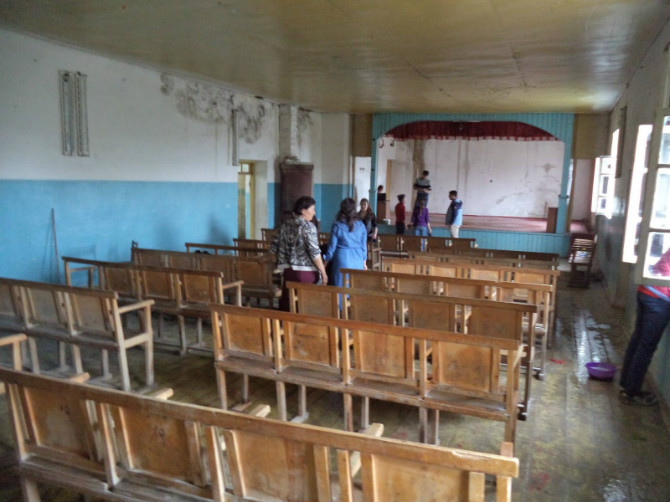
In addition to holding vocational classes for the children during the school year, the teachers have given leadership training for children. They consider the enthusiasm of children about renovating the club hall as one of the successful projects in the community.
"With the participation of students, parents, village youth, this has become a small community project. Such projects are very important for all of us. Maybe students living in a city and attending good schools won’t understand the importance of painting the wall, but here it has a totally different significance for children," Alberta says.
When Hetq reporters visited, the cleaning of the club was still in the process. We walked over the creaky floor to enter the hall with faded walls. Worn benches were placed in front of the stage, which was in a bad shape, but one could assume from its shape and arches that it used to be pretty attractive.
Although the children had cleaned the room, rainwater, leaking through different corners, was making puddles that seemed intent to engulf the whole place.
"Won’t the rainwater cause problems?" I asked, pointing to the leaking roof.
"The roof is very old, leaking in different places, but the children placed the benches in such a way that the rainwater doesn't drip on the benches, but somewhere in between," the teacher said.
The school is a few meters away from the club.
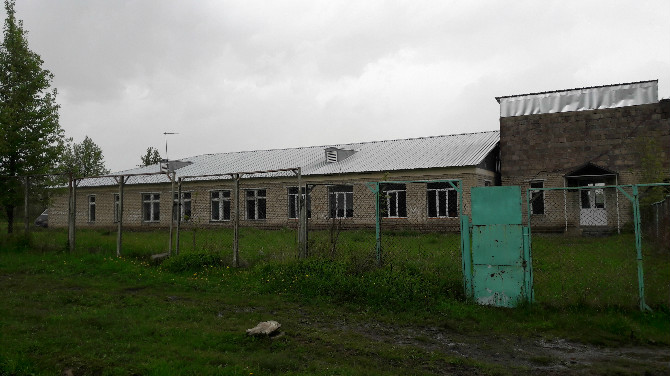
The projector is the first eye-catching device in the single-story, unattractive building of the school. It is placed in a relatively large room that is used for several purposes: leadership classes by Teach For Armenia participants, WikiClub works, various meetings and discussions.
Recently, they also started showing documentaries about the foundation of the village in this very room.
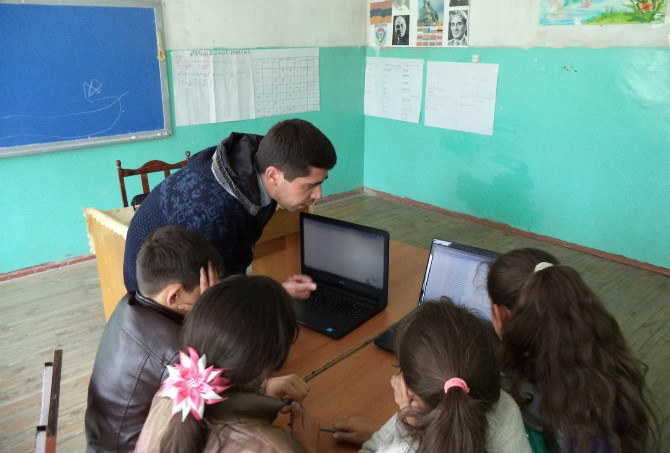
On Narek Hakobyan’s initiative, who’s one of the participants of the Teach For Armenia project, employees of the National Archive of Armenia have recently visited Urasar school, bringing archive materials about the history of the village as a gift.
"For every person, community and nation, it is important to know who their ancestors are, where they came from and where they are going. I really wanted the villagers to know their history," Narek says.

For 26-year-old Narek, the mere desire to work in a village has gradually transformed into a clear aim within the last years.
"Working in the rural areas seemed very appealing. When you see something from the outside, you want to go there and see the inside, too, to deeply understand what is actually going on, and somehow become a part of that life. That's an attractive feeling that I cannot explain," says Narek.
His family members were totally against him working in the village.
"They thought I would be far from them, in an unknown place. They hoped, until the last moment, that I would give up the idea, but as you can see, it did not happen," the young historian says, smiling.
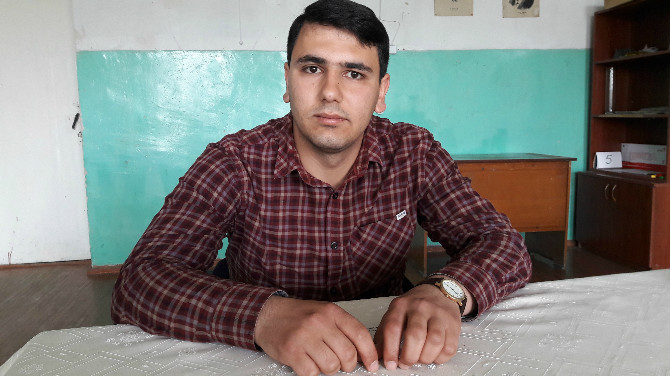
Narek, a Candidate of Historical Sciences, sees the work in the village as an advantage, in terms of scientific research and new achievements in the field. He says, "Life is quiet and peaceful here, and I like it. We have free time for new thoughts, new ideas. This peace helps me think, be engaged with science right here."
Armen Mkheyan, who came from Yerevan to Urasar within the same project, graduated from the Academy of Management, Financial Management Division. He finds the villagers’ sincerity especially attractive.
In his opinion, the potential of the children in villages is great, but they are cut off from the outside world, and, subsequently, are not able to fully demonstrate their possibilities.
"You know what's most interesting? The mentality in rural communities is totally different. They can tell you something outside the norm, and you have to try to find a solution. That’s what attracts me the most in the village. In city schools, children with a non-standard way of thinking are being standardized pretty quickly, while it’s totally different in villages.They can solve the task in a non-standard way and give me their solution. And I start to think whether to tell them that they should have solved it otherwise, or not. But they do solve it right, in their own way. And when the children show their uniqueness, you think of the ways to develop that potential,” Armen shares his impressions after the first year of teaching.
"Their perspective, their way of thinking is so pure that our first and foremost task is not to restrict the children and try to understand them," Narek adds.
If the boys arrived in Urasar with the growing desire to work in the village, Alberta, until recently, not only did not want to work in the village, but also thought herself unable to teach, while studying at university.
"I could not imagine myself at school, and I thought that I cannot and do not want to work with children. Later, after serving my internship at a school, my way of thinking totally changed. The students at that school were quite disciplined, which changed my attitude. It was the Spandaryan school in Yerevan," Alberta says.
She came to Yerevan from Ishkhanadzor village in Artsakh's Kashatagh region in 2012 to study. Something was keeping her back from returning to her native village.
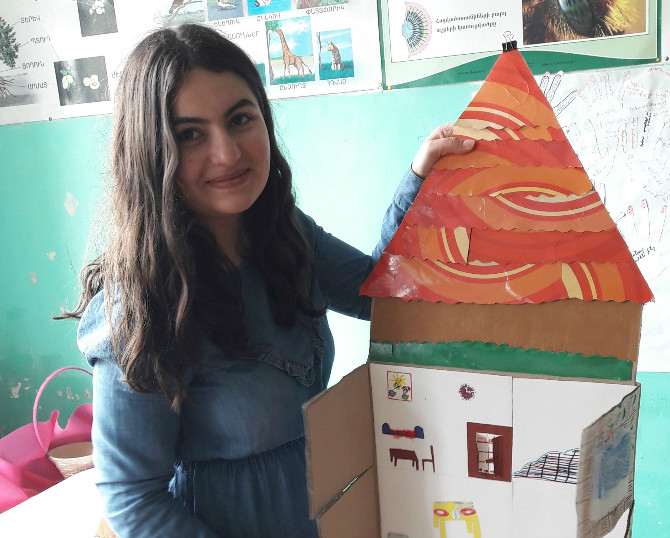
"When I was studying in Yerevan, I always thought that if I'm constantly talking about topics like staying in Armenia and doing something here, why don’t I find the courage in myself to return to my village and do something for it. Not that I was afraid to go back, but I was afraid to be the one who could go to the village and offer to do something there," the young teacher says.
In her opinion, Teach For Armenia is first and foremost helping to overcome that fear. As a result of teamwork, young teachers, together with children of Urasar, have already introduced the first changes in the village.
Due to the efforts of teachers and students, the area next to the school, serving as a football field, has been cleaned. Armen used his connections to get nets for the goalposts and soccer balls. The team applied to donors for fencing the perimeter of the stadium. If the project is approved, people in Urasar will soon have the opportunity to play football in a renovated stadium.
A few days ago, a WikiClub was founded in the school. Students of higher grades are involved in the club’s work.
The young teachers are working towards ensuring the continuity of education and professional orientation of the children. They’ve already witnessed the first results.
"In recent years, only a few of the primary school graduates continued their studies. It was not just because of the high school being far (in Stepanavan), but also due to the lack of information concerning future studies. When asked what they were going to do after graduating from the school, children did not have an answer. I was thinking, well, how should we work with these children so that they want to learn and understand the importance of studying further. That became an internal objective for the three of us. And this year, when not only all the students of the graduating class but also some of the last year's graduates, expressed their desire to continue their education, we were truly happy," says Alberta.
 Videos
Videos Photos
Photos




Comments (1)
Write a comment